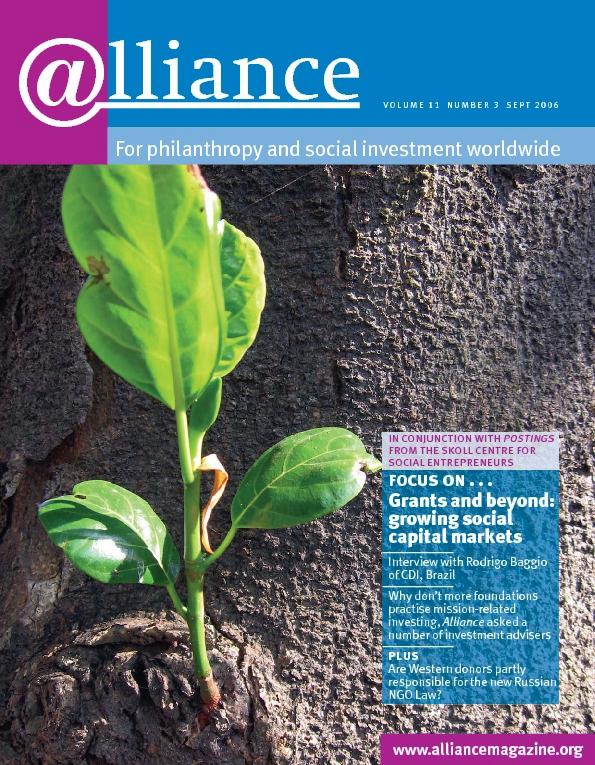I’ve been working in and for NGOs for more than 30 years. This work has taken me to five continents and the Western Pacific. I’ve had the great privilege to meet and work with extraordinary leaders in many fields. It’s been an incredible journey and one that I sincerely hope is far from over.
From where I stand now – looking back and looking ahead – I am excited by the variety and range of today’s innovations and innovators that aim to tap new income sources to support NGOs and others working for social causes. But I’m also wary about expecting too much from these developments.
I can honestly say that the last few years have been the most exciting and invigorating of my career:
- The resiliency of non-profit organizations has been proved through numerous trials.
- Civil society has burgeoned in parts of the world where only a decade ago we wouldn’t and couldn’t have predicted it would arise.
- The generosity of people the world over has been tested and proved in the wake of a series of disasters at a scale heretofore unknown.
- The ranks of the world’s leading business schools are swelling with idealistic innovators who seek to learn and adapt the most advanced management theory and practice to social and environmental goals.
- These and other social entrepreneurs are pioneering the creation of new approaches and new infrastructure for social purposes in all corners of the world, testing and proving new solutions.
All this is infusing a new optimism for the future in spite of the very real fact that humanity’s problems are accelerating at a pace that seems to exceed even the pace of innovation in science and technology.
Those of us who work to leave the world and its people just a little better than we found it have reason to be amazed at what has emerged as a powerful, rapidly evolving and adapting global community of changemakers who work across disciplines, sectors, continents and cultures.
While critics from the for-profit sector have got beyond the originally naive perception that NGOs just need to be a little more businesslike, social changemakers are increasingly convinced that their efforts must be well managed and that resources must be unleashed at greater levels than ever before to address society’s needs. The latest wave in innovation is emerging from the meeting of social and environmental goals with financial tools and mechanisms and its pioneers are pursuing the creation of an efficient, effective capital market for social good – a social capital market.
Anyone who has money to put to use faces a range of choices and vehicles, from pure non-commercial (charity or philanthropy) to pure commercial (invested solely for financial gain without regard for social or environmental effects). Between these two extremes lies a messy but promising middle. Some people want to invest or loan money for a social purpose and are willing to accept a below-market return. Some people want to invest for financial gain but want to do so in a way that measures success in social or environmental terms as well; these investments may or may not target market-rate returns. Philanthropy plus the ‘messy middle’ are included in most definitions of ‘social capital markets’.
I am an optimist – dyed in the wool, never give up, never give in. My glass is always half full and I have unshakable faith in the next generation. My daughter and her peers will solve many of the problems that my generation created, I have no doubt.
At the same time, I do not believe that we can blindly trust a capital market – socially oriented or otherwise – to fully address society’s most intractable problems. Some problems – like homelessness, slavery and the chronic diseases associated with poverty in the developing world – will never be solved through money alone.
The business leaders and others who once thought that NGOs simply needed to be run more like businesses have long since learned that a financial bottom line is in many ways easier to pursue than a social one. NGOs do need to be well managed, of course. And more resources do need to be delivered more effectively and efficiently where they will do the most good. But that is not the end of the story.
Let’s not risk the delay that will come if we are distracted by what looks like a simple solution to a complex problem. Yes, we need ever more efficient social capital markets. But we also must continue to build the knowledge, networks and public will to tackle problems where money may be essential but is most certainly not sufficient.
Barbara Kibbe is a senior consultant with the Monitor Institute. Email Barbara_Kibbe@gbn.com






Comments (0)